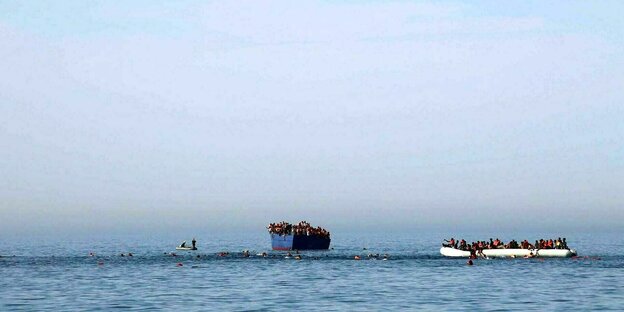It will be decided on Friday whether the largest trial to date against the maritime rescuers will be suspended. Kathrin Schmidt is one of the accused.

Crowded boats, people floating in the water: in April 2017, maritime rescue organizations rescued thousands of people in the Mediterranean Photo: iuventa/Picture Alliance
taz: Mrs Schmidt, this Friday it will be decided whether a preliminary procedure that has been underway since 2017 against you and other maritime rescuers from “Youth Saves”, “Save the Children” and “Doctors Without Borders” will be initiated. for allegedly aiding and abetting illegal entry. How are you right now?
Kathrin Schmidt: I am sure that this odyssey will soon end. We have mobilized for the trial date, friends and people who have accompanied us in solidarity are coming. We would like to share the moment.
What is your confidence based on?
The statements of the three witnesses in February were probably the decisive reason why the prosecutor did not want to continue with the trial. However, we have experienced so many absurd things over the years that the prosecutor's request surprised us.
What did the witnesses say?
These are former police officers who were employees of a security company aboard the “Vos Hestia”, a rescue ship belonging to the NGO Save The Children. The owner of his security company has ties to the Identitarian Movement in Italy. The accusation against us was based on the fact that these witnesses claimed to have seen things that did not actually happen.
Among other things, it was alleged that you worked with Libyan smugglers.
In February, the three could not remember anything they had previously claimed and could not clarify or describe what they claimed to have seen at the time. What really makes me angry is that everything could have happened at least five years earlier. All the data with which the Public Ministry justifies its decision were known from the first moment.
He was part of the crew of the maritime rescue ship “Iuventa”, which is currently undergoing tests in Italy. The procedure could be suspended on Friday.
How certain is it that the judge will heed the prosecutor's request?
There is a very unlikely chance that he will want to move forward with the trial. That would be shocking and would show great political pressure.
A representative of the Home Office was present at the last hearing and did not insist on a main hearing.
If even the Prosecutor's Office runs out of arguments, then the Ministry of the Interior will not be able to argue in court why things should continue. However, the government is an engine of criminalization that not only affects us, but systematically affects mainly refugees. The fact that the Ministry ultimately did not insist on a main hearing does not indicate that there is no political pressure in the background of this preliminary procedure.
The preliminary proceedings have been carried out for almost seven years. What was important to you during this time?
It was important for us not to be intimidated. We were successful. We were able to at least raise some awareness about how criminalization works, who it affects, and that there are no fair processes in this context. We were in a very privileged situation: we experienced a lot of solidarity, we were able to hire the best lawyers and our own translators, and international observers of the process came.
How much has this process cost you so far?
The price cannot be expressed in numbers. This goes far beyond the material, although the defense obviously cost us enormous amounts of money. But human lives were also lost because rescues could not be carried out. We had a perfectly equipped salvage ship that was confiscated in 2017. Now that's a lot of rust. Save The Children has completely withdrawn from maritime rescue.
Wasn't there also an opposite effect: greater solidarity?
Civil society has done a lot to counteract repression. I'm very grateful for that. But the solidarity that was so clearly evident to us does not mean that the repression does not continue to have an effect. Criminalization and solidarity are strong opposites, but they do not cancel each other out.
What specific consequences did the procedure have for you?
There were some jobs I wanted to do but didn't get because of the process. There were no offline threats, there were certainly online threats, but I chose to protect myself from them and not consume social media.
Did the process prevent you from continuing to get involved in maritime rescue?
No. Since then I have worked for two other NGOs and, among other things, I coordinate rescues. I am currently responsible for a lifeboat department. The other defendants also continued.
